Adaptive triggers are specialized hunting devices that let you shoot a firearm despite mobility or dexterity challenges. They include bite-activated mechanisms, cable-pull systems, and hydraulic triggers that can be operated with different body parts. These customizable tools promote independence while maintaining safety and control. You’ll find options like the BT100 Mechanical Bite Trigger or TM-100 mouth-activated system. Various organizations offer grants and support to help you access this life-changing equipment.
Understanding Adaptive Trigger Technology for Hunters
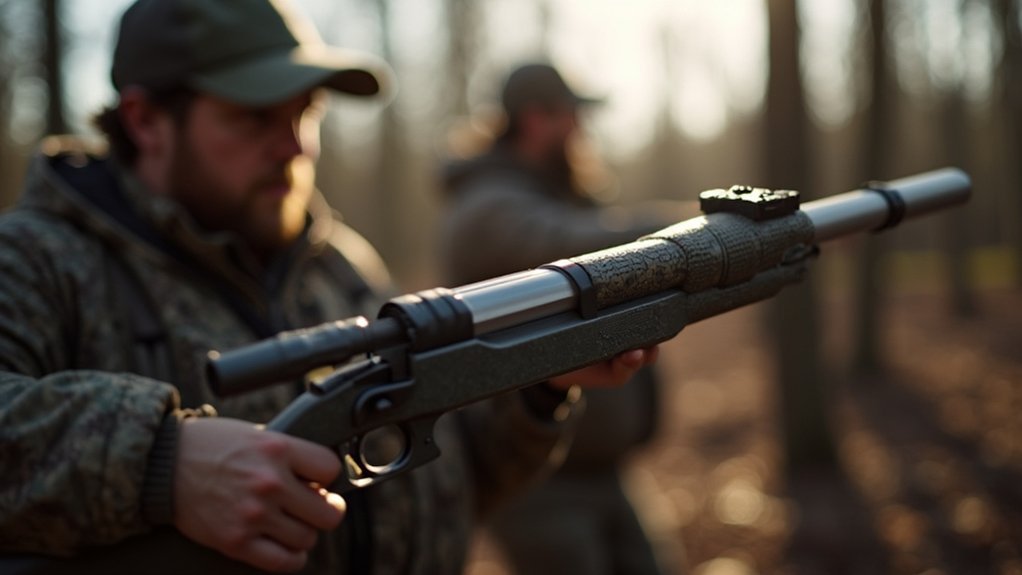
While traditional hunting tools often present barriers for disabled sportspeople, adaptive trigger technology has revolutionized accessibility in the field. These specialized triggers can be activated through alternative methods like cables or bite mechanisms, eliminating the need for conventional hand placement.
Adaptive trigger innovations overcome physical limitations, offering disabled hunters dignified participation through alternative activation methods.
You’ll find these devices are highly customizable to your specific needs and abilities. Whether you have limited mobility or dexterity challenges, adaptive triggers can be tailored to work with your unique situation.
The technology includes hydraulic systems and innovative designs that allow activation using different body parts. Similar to how PS5’s DualSense provides lifelike interactions in gaming, these adaptive hunting triggers offer realistic feedback for better control.
Safety remains paramount with these modifications, as properly configured adaptive triggers maintain or even enhance firearm safety. This technology isn’t just about accommodation—it’s about creating an equal opportunity for you to experience the full enjoyment of hunting.
Types of Adaptive Triggers Available on the Market
You’ll find bite-activated trigger solutions specifically designed for hunters with limited or no hand function, allowing you to fire by applying pressure with your mouth.
Cable-pull systems offer flexibility by routing the trigger mechanism to any accessible body part that retains movement control.
These mechanical adaptive triggers require no electricity and can be quickly transferred between different firearms, making them reliable options for your hunting adventures. With over 1.7 million disabled individuals participating in hunting annually, the demand for such specialized equipment continues to drive innovation in the adaptive hunting market.
Bite-Activated Solutions
Three primary bite-activated trigger options dominate today’s adaptive hunting market. These innovative solutions allow you to fire your weapon by simply applying pressure with your mouth, creating new possibilities if you have limited hand mobility or strength.
- The BT100 Mechanical Bite Trigger lets you “feel” the trigger activation through your mouth for intuitive control.
- Disposable Bite Bulbs and Tubing provide cost-effective options for multi-user environments.
- Bite triggers work with both firearms and crossbows, expanding your hunting versatility.
- Designed for easy attachment and quick setup on various weapons.
- Available through specialized providers like BE-Adaptive Products who focus on inclusive outdoor equipment.
When paired with specialized support stands, bite triggers can transform your hunting experience, making previously inaccessible activities possible regardless of physical limitations.
More advanced options like the TM-100 mouth-activated mechanism improve reaction time and accuracy for shooters with progressive conditions.
Cable-Pull Trigger Systems
Beyond bite-activated options, cable-pull trigger systems represent another powerful solution for hunters with limited hand strength or mobility. These systems use mechanical cables similar to bicycle brakes that connect from an accessible control point to your firearm’s trigger. Hunters often face initial challenges with trigger mechanism designs that require careful modifications to function properly.
| Feature | Benefit |
|---|---|
| Customizable length | Positions control where you can easily reach |
| Clothespin attachments | Assists hunters with reduced dexterity |
| Modular components | Adapts to different firearms and needs |
| DIY compatibility | Can be enhanced with 3D-printed parts |
You’ll need to guarantee proper trigger reset after firing, as this is a common failure point. Many users create custom setups due to limited commercial availability. Always test thoroughly before hunting and incorporate appropriate safety measures to prevent accidental discharge.
Benefits of Using Adaptive Triggers While Hunting
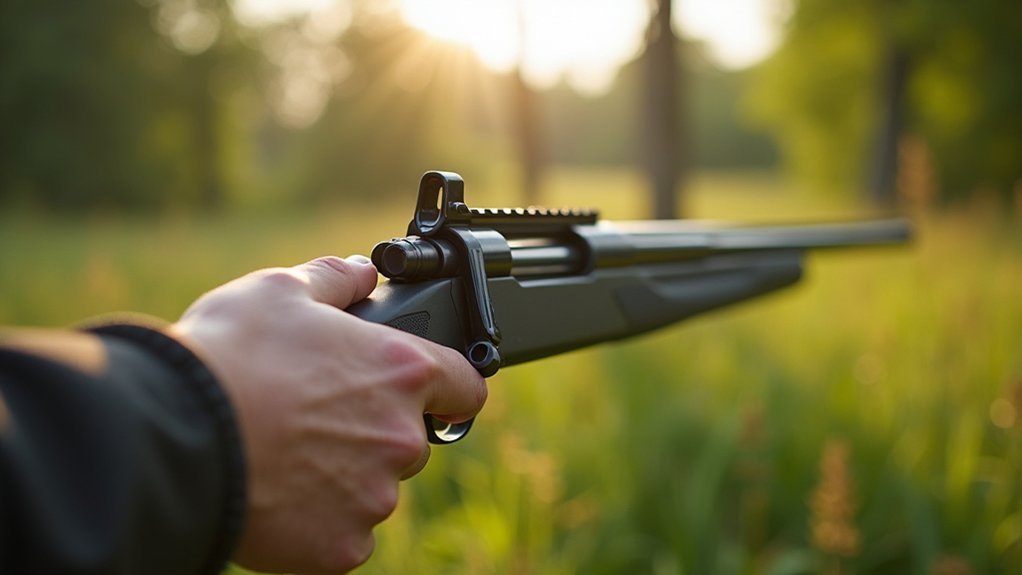
By using adaptive triggers, you’ll gain remarkable independence in the field while maintaining complete control of your firearm.
You’ll experience hunting on your own terms, with equipment specifically designed to accommodate your physical needs without requiring constant assistance from others.
These specialized triggers don’t compromise safety—they enhance it by providing more stable, controlled shooting experiences tailored to your unique capabilities.
Companies like Be Adaptive offer various trigger pull options designed for hunters with different types of disabilities, from bite triggers to specialized rifle stands.
Greater Independence Afield
Once confined to the sidelines, hunters with disabilities now experience unprecedented freedom in the field thanks to adaptive trigger technologies.
You’ll find these specialized devices enable hunting without requiring traditional grip or finger strength, using bite or mouth activation instead. These innovations transform hunting from an observer experience to an active pursuit. Working with NRA-trained instructors, hunters can learn proper techniques for these adaptive systems while maintaining safety protocols.
- Customize your trigger system for your specific hunting situation
- Focus on the thrill of the hunt rather than mechanical challenges
- Hunt independently without constant assistance from others
- Experience the confidence boost that comes with self-reliance
- Join the hunting community as an equal participant rather than a spectator
This technology bridges the gap between physical limitations and outdoor passions, allowing you to reclaim your place in nature’s arena.
Safety Without Compromise
The paramount concern for any hunter using adaptive technology is maintaining safety without sacrificing effectiveness in the field.
Adaptive triggers excel in this area by providing customized activation methods tailored to your specific needs and abilities.
With hydraulic systems offering precise control and specialized trigger mechanisms that can be activated through alternative means like biting down on a device, you’ll experience enhanced safety and accuracy simultaneously.
These modifications simplify firearm operation while reducing physical strain, letting you focus on the hunt rather than your limitations.
The improved stability and control not only increase your accuracy but also greatly reduce accident risks.
Specialty products like the TM100 and JT45 trigger activators have revolutionized shooting accessibility for hunters with various disabilities.
You’ll find that these specialized triggers provide the perfect balance—making hunting more accessible without compromising on safety standards that protect both you and others in the field.
How to Choose the Right Adaptive Trigger for Your Needs
Selecting the right adaptive trigger for your hunting needs requires careful consideration of several factors that directly impact your safety, comfort, and shooting success.
You’ll need to match the activation method to your specific capabilities and limitations, whether that’s a mechanical cable, bite-activated, or electronic trigger system.
- Assess your strength capabilities to determine the appropriate trigger pull force and sensitivity settings.
- Confirm compatibility with your existing mobility aids, wheelchair mounts, or tripods.
- Choose weather-resistant and durable materials that will function reliably in all hunting conditions.
- Look for customizable options that can be adjusted as your needs change or for different hunting scenarios.
- Test the trigger in realistic field conditions before committing to verify it meets your requirements.
Consider the Brass Stacker Slide Pull as a complementary accessory if you experience difficulty with finger strength when chambering rounds.
Success Stories: Disabled Hunters Using Adaptive Triggers
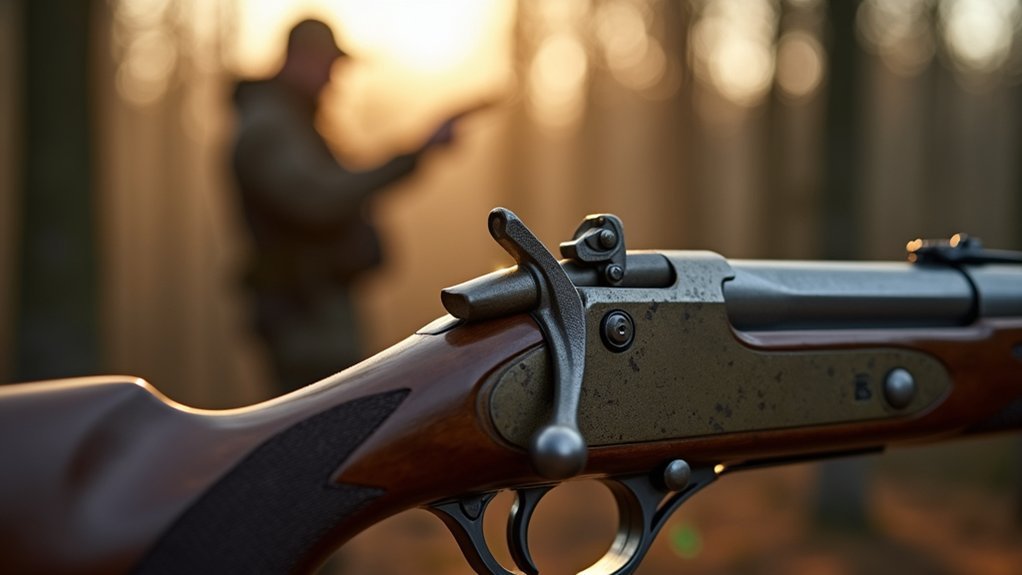
Across hunting grounds throughout the country, remarkable success stories continue to emerge as disabled hunters reclaim their passion through innovative adaptive trigger technologies.
From sip-and-puff systems to microswitch activations, these adaptive solutions are transforming lives.
You’ll find hunters using 3D-printed custom triggers tailored to their specific needs, while others rely on chin-operated controls or power gun mounts for stability.
These technologies don’t just enable hunting—they rebuild confidence and independence.
Many hunters report profound emotional connections when returning to a beloved activity they thought lost forever. Ryan Kinnear, who defied his early prognosis of just 5 years with Spinal Muscle Atrophy Type 2, uses a custom rifle chassis mounted to his wheelchair that he operates via a microswitch.
Community plays a crucial role too, with organizations hosting inclusive events where hunters share experiences and form lasting bonds.
Through adaptive equipment, hunters with disabilities aren’t just participating—they’re achieving personal goals and creating meaningful outdoor memories with family and friends.
Resources and Support for Obtaining Adaptive Hunting Equipment
For disabled hunters seeking adaptive equipment, maneuvering the available resources can initially seem overwhelming, but numerous organizations stand ready to provide both financial assistance and practical guidance.
You’ll find several pathways to acquire the adaptive triggers and equipment you need:
- Buckmasters American Deer Foundation (BADF) offers free adaptive equipment through their grant program and local chapters.
- Be Adaptive Equipment Inc. specializes in high-quality gear specifically designed for hunters with disabilities.
- NRA Adaptive Programs provides resources for specialized shooting techniques and technologies.
- Adaptive Sportsmen Grants help fund purchases of customized hunting equipment.
- State and local initiatives often provide additional support through government programs or community fundraising events.
Many of these organizations also offer community support networks where you can connect with experienced adaptive hunters. The NRA Adaptive Shooting Program focuses on creating tailored approaches that address each individual’s unique needs while maintaining safety standards.
Frequently Asked Questions
Are Adaptive Triggers Legal in All Hunting Jurisdictions?
Adaptive triggers aren’t legal in all hunting jurisdictions. You’ll need to check your state’s specific regulations as laws vary considerably. Some states require special permits for using adaptive equipment while hunting.
Can Adaptive Triggers Be Installed on Any Firearm?
No, you can’t install adaptive triggers on every firearm. While they’re compatible with many weapons, they often require custom modifications or fittings. Firearm design, caliber, and specific mechanisms affect installation possibilities.
What Is the Typical Cost Range for Adaptive Trigger Systems?
You’ll typically find adaptive trigger systems ranging from $400-440 for basic mechanisms like the TM100. Hand devices cost around $117, while additional accessories and customizations can greatly increase your total investment.
Do Insurance Plans Cover Adaptive Triggers as Medical Equipment?
Most insurance plans don’t consistently cover adaptive triggers. You’ll find coverage varies by policy, with many requiring clear medical necessity documentation. Seek alternative funding through grants or organizations that support adaptive equipment.
How Do Weather Conditions Affect Adaptive Trigger Performance?
Weather conditions greatly impact your adaptive trigger’s performance. You’ll find rain and snow require waterproofing, cold temperatures may affect sensitivity, humidity can cause corrosion, and wind impacts stability during aiming. Regular maintenance is essential.
In Summary
Adaptive triggers can transform your hunting experience if you have a disability. You’ll find these specialized devices open up new possibilities, giving you control and independence in the field. Whether you’re dealing with limited hand strength or mobility challenges, there’s an adaptive trigger solution for your needs. Don’t hesitate to reach out to support organizations—they’re ready to help you continue enjoying the hunting tradition you love.

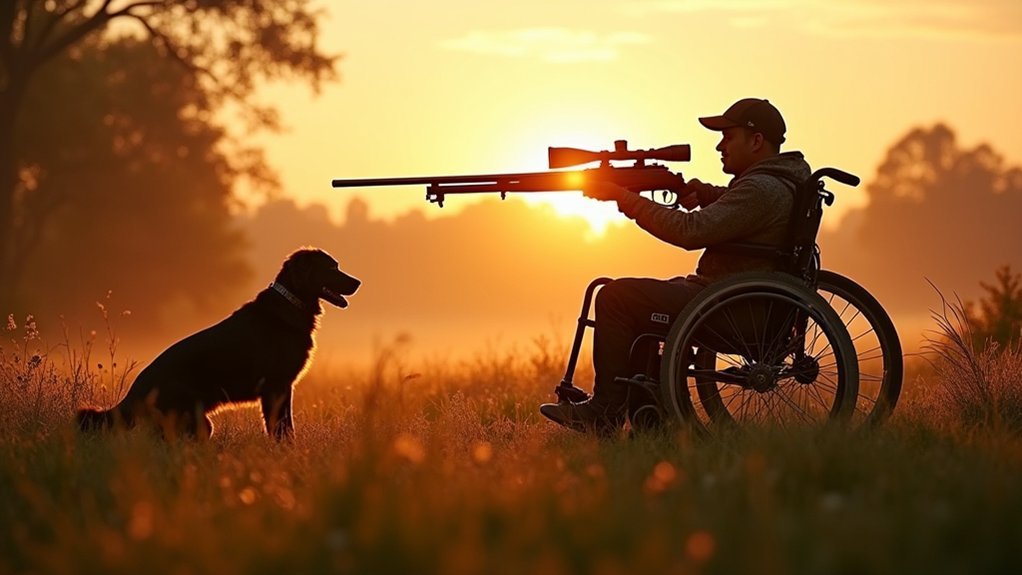
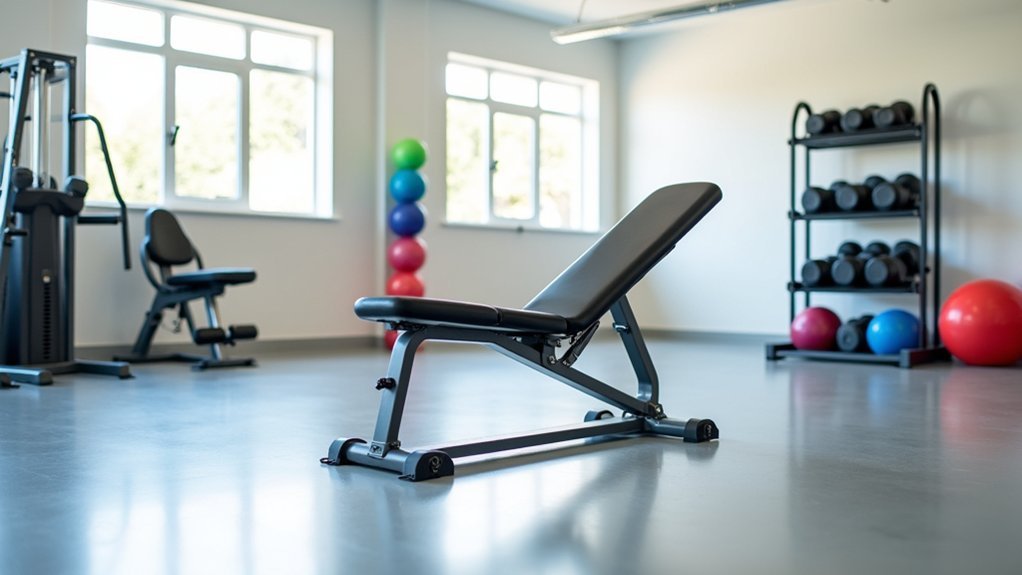
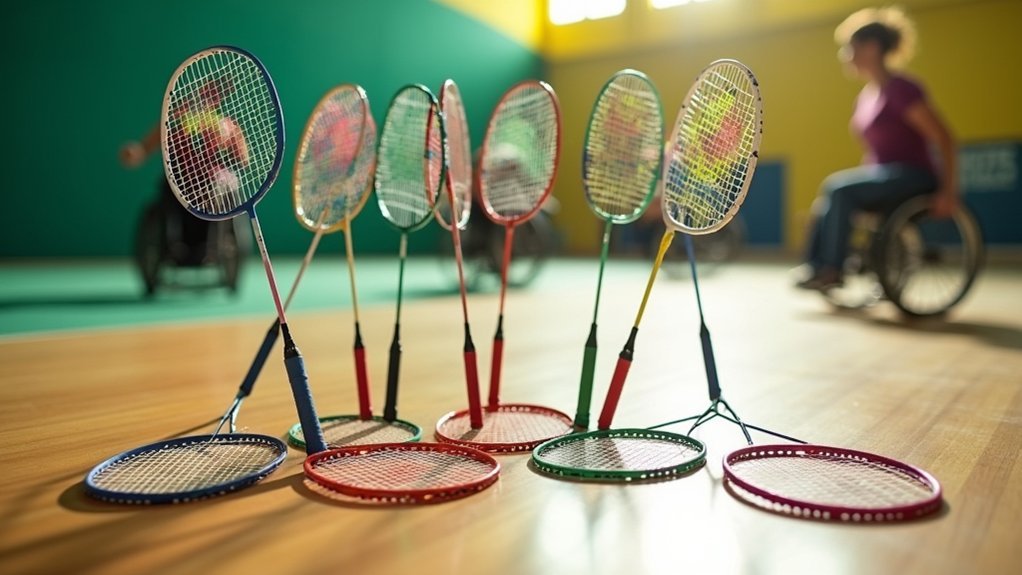
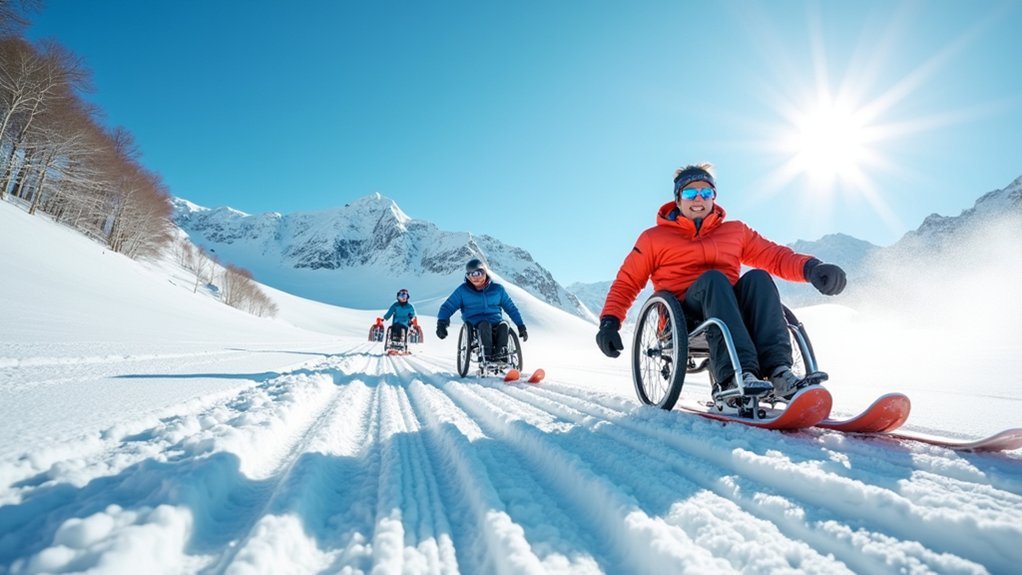
Leave a Reply